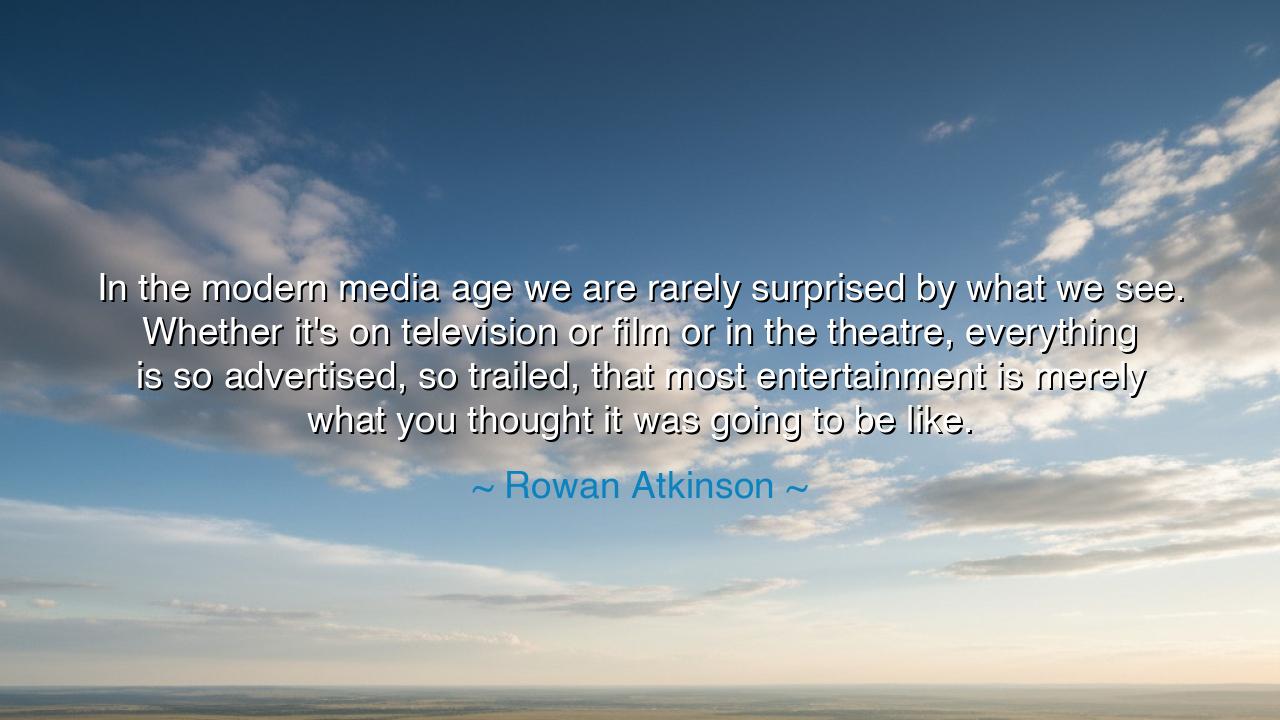
In the modern media age we are rarely surprised by what we see.
In the modern media age we are rarely surprised by what we see. Whether it's on television or film or in the theatre, everything is so advertised, so trailed, that most entertainment is merely what you thought it was going to be like.






"In the modern media age we are rarely surprised by what we see. Whether it's on television or film or in the theatre, everything is so advertised, so trailed, that most entertainment is merely what you thought it was going to be like." — Rowan Atkinson
In this profound observation, Rowan Atkinson speaks to the heart of the modern media age, a time when we are no longer taken by surprise by the entertainment that is presented to us. The once unpredictable nature of stories—whether told on the stage, the screen, or through print—has been replaced by a carefully crafted narrative that reveals all before the curtain ever rises. From the first hints in a trailer to the barrage of advertisements, we are no longer passive observers of a mystery waiting to unfold. Instead, we are bombarded with information that spoils the very essence of surprise, leaving us with mere expectations rather than genuine discovery.
In ancient times, the storyteller was revered for his ability to weave mystery and intrigue. The greatest tales of the ancient world, from the epic of Homer’s Iliad to the tragedies of Sophocles, were built upon the element of the unknown. The audience sat in anticipation, wondering what would come next, allowing the suspense to stir their hearts and minds. The storyteller’s gift was his ability to keep the audience engaged by revealing just enough to draw them in, while still holding something back. It was this mystery that gave the story its power, and the audience's involvement was heightened by the thrill of discovery.
Yet, in today’s world, that sense of mystery has been eroded by the overwhelming presence of the media. Movies, television shows, and theatre productions are no longer experiences of discovery, but rather extensions of marketing campaigns. The trailers and promos that precede them reveal so much that by the time we sit down to view the final product, we are already familiar with the key plot points, the twists, and the emotional beats of the story. We go in with a sense of expectation, not wonder. In essence, the magic of storytelling—its power to surprise, to amaze, to challenge our perceptions—has been dulled.
Think, for example, of the rise of social media in shaping our perceptions before we even experience something for ourselves. The ancient Greeks, when they gathered for the Dionysian festivals, did so with no prior knowledge of what their playwrights would reveal. The plays were unpredictable, and the power of theatre lay in its ability to elicit raw, immediate reactions. Today, however, with every tweet, every Instagram post, every behind-the-scenes clip, we are fed fragments of stories long before they reach us. The true experience of the play, film, or show is no longer about the unfolding drama but about how well it can live up to the expectations we have already formed.
Even within the realm of advertisement, the same truth holds. We are shown images, words, and snippets that create a clear image of what we will experience. Homer once said that "fame is the scent of a flower," meaning that the scent of a story or a piece of art could only be revealed after the flower had bloomed. In today’s world, we are given the full fragrance long before the flower ever opens. This constant exposure to information, this excessive preparation, leaves little room for the emotional journey of discovery. The entertainment that we consume has become a mere product, one that we have been conditioned to expect.
Rowan Atkinson’s words are not a condemnation of the media itself, but a reflection on the consequences of living in a world that is over-saturated with information. We have traded the thrill of the unknown for the certainty of expectation. This lesson is not just about entertainment, but about how we live our lives. Anticipation, surprise, and wonder are precious elements of the human experience, and they should not be sacrificed for the sake of control or convenience. There is beauty in the unexpected, and our lives too often are filled with so much information and noise that we lose the ability to experience something as pure discovery.
So, let us remember that the joy of life lies not in knowing everything before it happens, but in living each moment with a sense of curiosity. In an age where the veil of mystery has been lifted, let us seek to rediscover the beauty of the unknown. Let us reclaim the surprise that comes with genuine engagement, whether it is in the stories we encounter or the paths we take in our lives. Instead of letting ourselves be consumed by the overwhelming rush of information, let us be willing to embrace the unknown, to take joy in the unfolding of the narrative, and to live with an open heart, ready to be surprised by what comes next.






AAdministratorAdministrator
Welcome, honored guests. Please leave a comment, we will respond soon